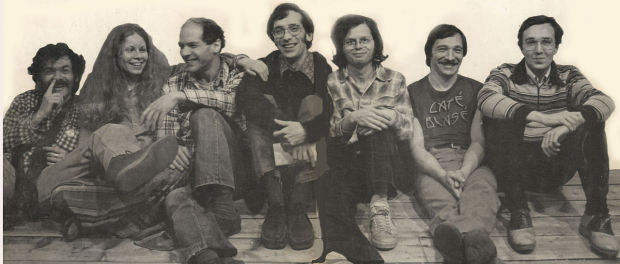Book of the Month Club: All I Can Say for Sure by John McAuley
 The Vehicule poets (left to right: Endre Farkas, Claudia Lapp, Artie Gold, John McAuley, Ken Norris, Tom Konyves, Stephen Morrissey).
The Vehicule poets (left to right: Endre Farkas, Claudia Lapp, Artie Gold, John McAuley, Ken Norris, Tom Konyves, Stephen Morrissey).
“Respect your instrument.
Its offices will surprise.
Work for true poems true to you.
The rest are Styrofoam and glue.”
(“Four Tweets to a Young Poet”)
John McAuley is one of seven writers that formed the Vehicule Poets group in the 1970s, a group influenced by the avant-garde literature movements and the artistic innovations of the times. Each writer has a strong connection to Montreal, being either a “born and bred” Montrealer or a Montrealer by adoption. Strangely enough, however, All I Can Say for Sure is not an inflated oratory to the charms and wonders of the multicultural island. It is a mix of reflections of times gone by, on people past and future, and free translations of Classic poets (or so the claim goes—I didn’t take that class).
There is much to like about McAuley’s latest offering. For one, the title: All I Can Say for Sure. Taken from one of the last poems, “Cohen” (of the Leonard persuasion), it gives a picture of the writing in six words. Any attempt to liken McAuley’s poetry to another would inevitably turn stale very soon. His writing is deceptively simple, its poems mostly free verse. It is not just another poetry anthology: it is a lesson in writing. While McAuley’s writing is poetry by form, it seems like musical prose when read aloud. It is difficult to say why a piece of writing works. To use a cliché, but one entirely appropriate, you know good writing when you see it. Or, as McAuley states in “Poetry Reading”, “the gut always knows first”—but take it in a happier sense this time. Here, the writing just works. It comes off the page: it is the words in an order and a flow only a longtime poet would be able to write. I could “hear” many of the works in my mind.
Each of the five sections offer small wonders to enjoy, but I preferred the poems from “Instances and Proof” and “Rewired” the most. “Instances and Proof” is a reflection of misadventures that mostly occur in young adulthood (the dreaded “Exam” being one of them, of course). Culminating with “They Were Heroes Once”, the level of awareness of the poems from this poem forward seem to shift from the self to others, towards the world and the craft of writing. “The hazards of shredded air, of generals’ vanity,/of raw stink and rot, of the ill-informed drift/in the Trench Warfare Department” is all captured in a nine stanza work that manages to collect the horrors of World War I and the war dead and transition into a moving portrait of his grandfather. Another work, “Virginia Woolf”, delves into the famed writer’s thoughts and and emotions as her mental wellbeing collapses around her and she prepares to commit suicide. Others particularly of note all deal with a writer reflecting on his craft and the writers and thinkers who came before him, worked with him, and stand waiting: the call and response form of “A Poet’s Grammar”, a tribute to fellow Vehicule writer Artie Gold (who had passed on back in 2007), and, of course, the quoted poem, “Four Tweets to a Young Poet”. The quoted stanza might just be one of the best pieces of advice a writer could give.
Very much recommended.





